Syrian Crypto Access Checker
Check if you can legally use cryptocurrency services in Syria based on OFAC's sanctions relief. The rules changed significantly in 2025, but targeted sanctions remain for specific individuals and entities.
Are you on the SDN list?
The Specially Designated Nationals (SDN) list contains individuals and entities sanctioned by the U.S. government. If you're on this list, you're still blocked from using crypto services.
Do you work with sanctioned entities?
This includes working with or for individuals or groups connected to the Assad regime, human rights violators, Captagon traffickers, ISIS, Al-Qa'ida, or Iranian proxies.
Do you have any involvement with sanctioned activities?
This includes activities related to terrorism, human rights abuses, chemical weapons, or other prohibited actions under U.S. sanctions.
Your Eligibility Status
Before June 2025, if you were a Syrian citizen trying to use Bitcoin or Ethereum, you were breaking U.S. law. Not because you were doing anything shady - but because the U.S. government had blocked nearly every financial connection between Syrians and the global digital economy. Crypto exchanges like Coinbase and Kraken couldn’t serve you. Wallet providers wouldn’t let you sign up. Even sending a small amount of crypto to a family member abroad could trigger a federal investigation. That changed on July 1, 2025.
The Sanctions That Locked Syrians Out of Crypto
For over 20 years, U.S. sanctions on Syria were sweeping. They didn’t just target warlords or regime officials - they blocked everyone. The Syrian Sanctions Regulations (SySR), first issued in 2004, made it illegal for any U.S. person or company to engage in transactions with Syrian nationals, regardless of their role in society. This meant Syrian students, doctors, small business owners, and farmers couldn’t use crypto platforms, even if they had no ties to the government. Many turned to peer-to-peer trades, offshore exchanges, or informal networks just to hold value. But those workarounds were risky, slow, and often left people vulnerable to scams.What Changed in June and July 2025
On June 30, 2025, President Trump signed Executive Order 14312, revoking six core sanctions orders that had been the legal backbone of Syria’s financial isolation. The next day, July 1, those restrictions officially ended. By August 26, the Office of Foreign Assets Control (OFAC) removed the entire Syrian Sanctions Regulations from the Code of Federal Regulations. It wasn’t a tweak - it was a full deletion. The program that had been used to freeze Syrian bank accounts and shut down crypto access for over two decades was erased from U.S. law.General License 25: The Key That Unlocked Access
Even before the full repeal, General License 25, issued on May 28, 2025, gave Syrian users a legal path forward. It authorized transactions that would have otherwise violated the SySR - including buying, selling, or holding cryptocurrency with U.S.-based platforms. This license didn’t just allow exceptions - it made those activities legal by default. Suddenly, Syrians could open accounts on Binance, Kraken, or even decentralized wallets like MetaMask without fear of violating U.S. law. The license covered individuals, not just companies, meaning ordinary people could now access global crypto markets.518 Names Removed from the SDN List
OFAC didn’t just lift blanket restrictions - it cleaned up the list. On August 15, 2025, 518 Syrian individuals and entities were removed from the Specially Designated Nationals (SDN) list. These were people who had been blocked under the old sanctions, even if they had no connection to terrorism, human rights abuses, or the Assad regime. Many were small traders, tech workers, or aid workers who simply lived in Syria. Their removal meant they could now legally hold crypto, receive payments, or invest in blockchain projects without triggering compliance flags.
What’s Still Blocked - And Why It Matters
This wasn’t a total free-for-all. OFAC kept sanctions on more than 100 people and groups tied to the Assad regime, human rights violators, Captagon traffickers, ISIS, Al-Qa’ida, and Iranian proxies. That means crypto platforms still have to screen users - but now the goal is precision, not blanket exclusion. A Syrian teacher in Aleppo can now use a U.S. exchange. A commander linked to chemical weapons cannot. The difference is in the data. Exchanges must now use better identity verification, geolocation checks, and transaction monitoring to tell the two apart. Many smaller platforms still struggle with this. Some still block all Syrian users out of caution - even though they don’t have to.Technology Is Now Legal to Import
It’s not just money that changed. On September 2, 2025, the Bureau of Industry and Security (BIS) launched License Exception Syria Peace and Prosperity (SPP). This lets anyone send cryptocurrency mining rigs, blockchain servers, or even laptops used for crypto trading into Syria without a special license. Before this, importing a single ASIC miner required months of paperwork and approval - if it was approved at all. Now, Syrian crypto miners can legally buy equipment from U.S. suppliers. This could spark a local blockchain ecosystem, especially in cities like Damascus and Homs, where internet access is improving and young tech talent is growing.How This Affects Real People
In Aleppo, a woman named Leila runs a small online clothing store. Before July 2025, she had to rely on cash transfers through third parties in Turkey - often losing 20% in fees and waiting weeks for funds. Now, she accepts USDT directly from customers in Jordan and Lebanon. She stores it in a non-custodial wallet and converts it to Syrian pounds through a local exchange that’s now compliant with U.S. rules. In Hama, a university student uses crypto to pay for online courses from U.S. universities. Before, he couldn’t. Now, he can. These aren’t rare cases - they’re becoming common.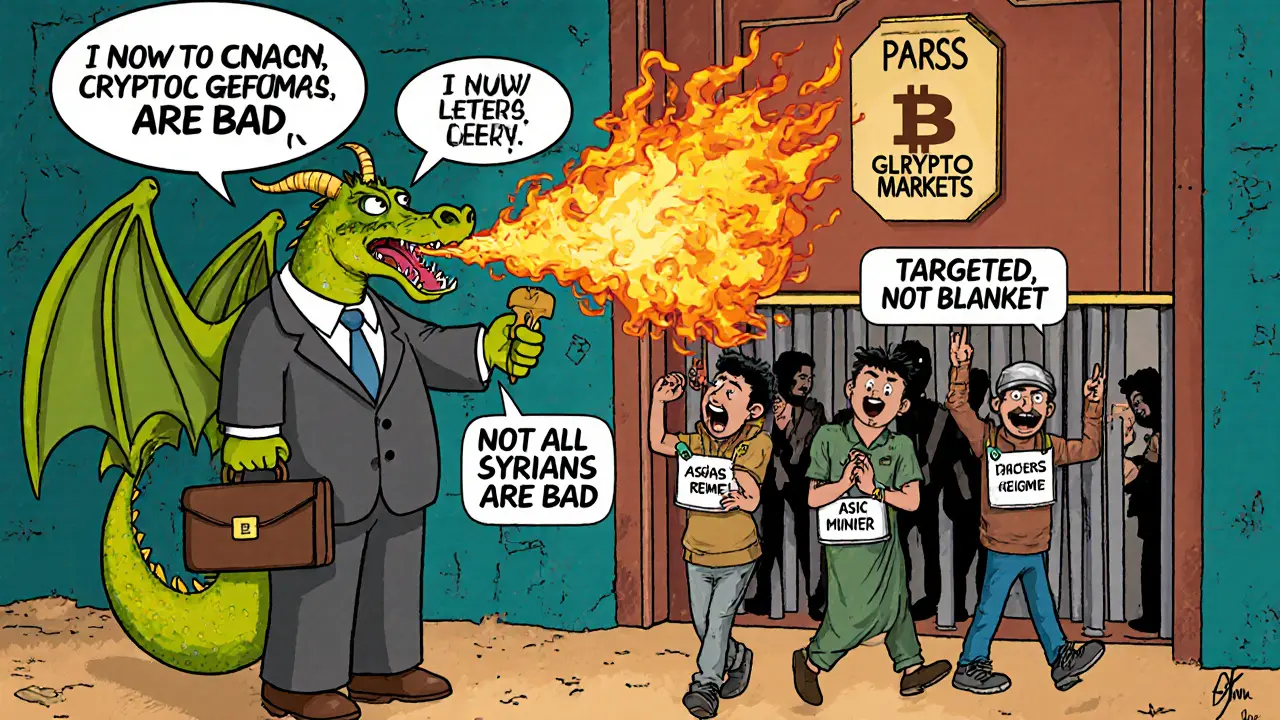
The New Name, The New Rules
OFAC didn’t just remove old rules - it renamed the program. On September 24, 2025, the Syrian Sanctions Regulations became the Promoting Accountability for Assad and Regional Stabilization Sanctions Regulations (PAARSS). The new name signals a shift: instead of punishing an entire population, the U.S. is now targeting specific bad actors. This matters because it changes how compliance teams think. Instead of asking, “Is this person from Syria?” they now ask, “Is this person on the SDN list?” That’s a huge difference. It turns a geographic ban into a person-based one.What’s Next for Syrian Crypto Users
OFAC has said it plans to add new interpretive guidance under PAARSS in late 2025 and early 2026. That could mean clearer rules on DeFi, NFTs, or stablecoin usage. It could also mean new restrictions if the situation in Syria worsens. But for now, the door is open. The biggest challenge isn’t law - it’s awareness. Many Syrians still believe crypto is illegal. Many exchanges still block them out of fear. The real work now is education - for users, for platforms, and for regulators.Why This Matters Beyond Syria
Syria is the first country where the U.S. completely lifted comprehensive sanctions on a civilian population while keeping targeted sanctions on bad actors. This is a test case for the future of sanctions. If it works - if crypto access improves livelihoods without helping terrorists - other countries could follow. Venezuela, Iran, and North Korea are watching closely. The message is clear: financial inclusion doesn’t mean giving up security. It means being smarter about who you block.Can Syrian citizens now use U.S. crypto exchanges like Coinbase or Kraken?
Yes. Since July 1, 2025, General License 25 allows Syrian individuals to use U.S.-based cryptocurrency exchanges, wallet providers, and DeFi platforms. Exchanges must still screen users against the SDN list, but they can no longer block all Syrians by default. Many platforms have updated their systems to allow verified Syrian users to sign up.
Are all Syrians now free from U.S. sanctions?
No. While comprehensive sanctions on Syria were lifted, targeted sanctions remain in place for over 100 individuals and entities linked to the Assad regime, human rights abuses, terrorism, and drug trafficking. If a Syrian person is on the SDN list, they’re still blocked. The change means the entire population is no longer assumed guilty - only specific bad actors are.
Can Syrians buy crypto mining equipment from the U.S.?
Yes. Since September 2, 2025, License Exception Syria Peace and Prosperity (SPP) allows the export of nearly all U.S. technology to Syria without a license. This includes ASIC miners, servers, laptops, and software used for cryptocurrency mining and blockchain operations. Previously, even a single mining rig required a special export license that was rarely granted.
Do Syrian crypto users need to worry about U.S. penalties now?
Only if they’re on the SDN list or dealing with sanctioned entities. For ordinary Syrian users transacting through compliant platforms, there is no risk of U.S. penalties. Civil fines of up to $20 million or criminal prosecution no longer apply to general crypto use. The legal risk has shifted from the user to the platform - which must now ensure they’re not serving blocked persons.
Why did OFAC change the name of the sanctions program?
The program was renamed to the Promoting Accountability for Assad and Regional Stabilization Sanctions Regulations (PAARSS) to reflect the shift from broad economic isolation to targeted enforcement. The old name implied a blanket ban on Syria. The new name makes it clear the U.S. is focused on holding specific individuals accountable, not punishing civilians.
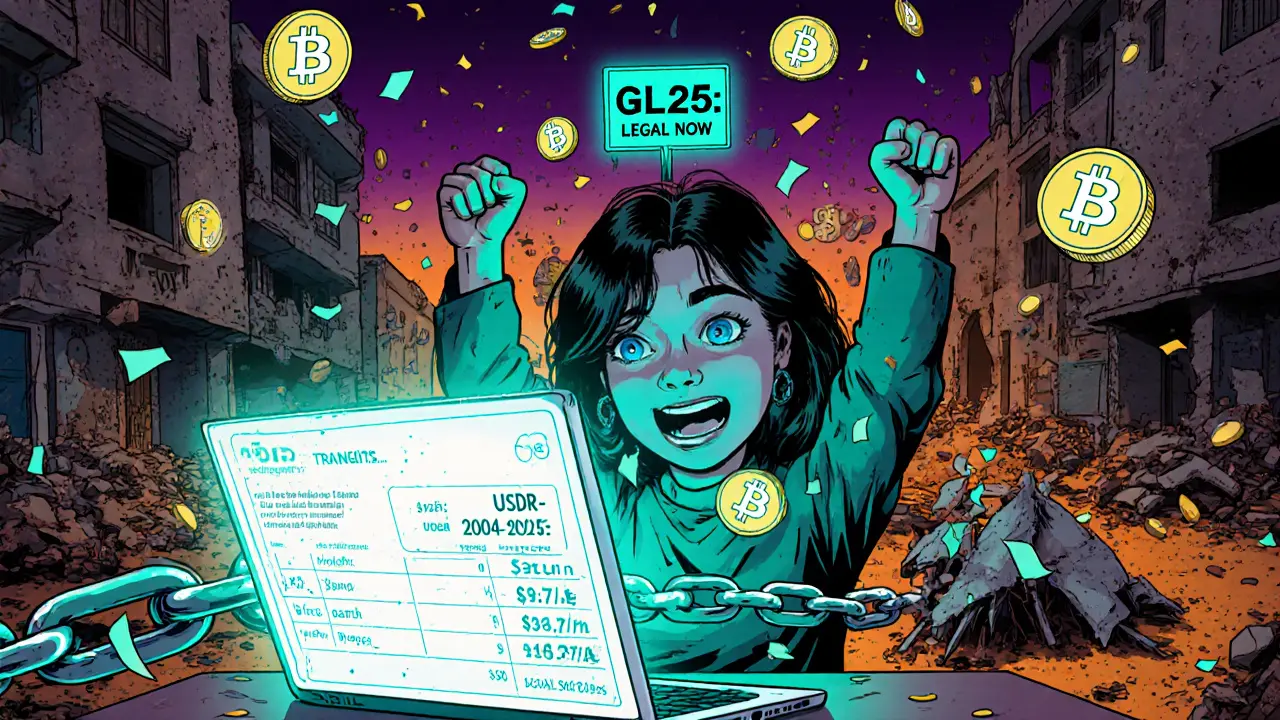
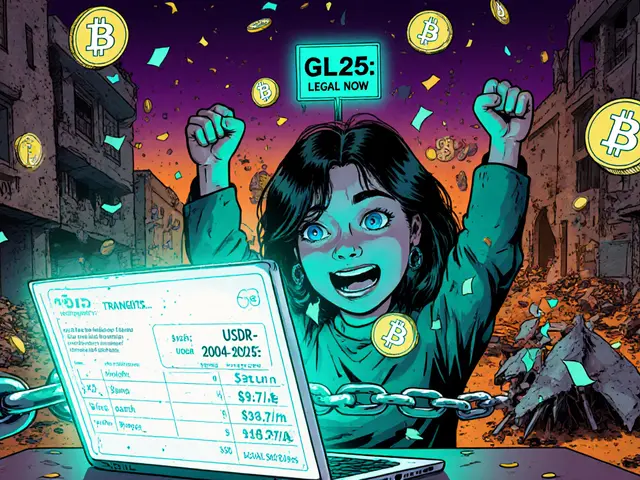
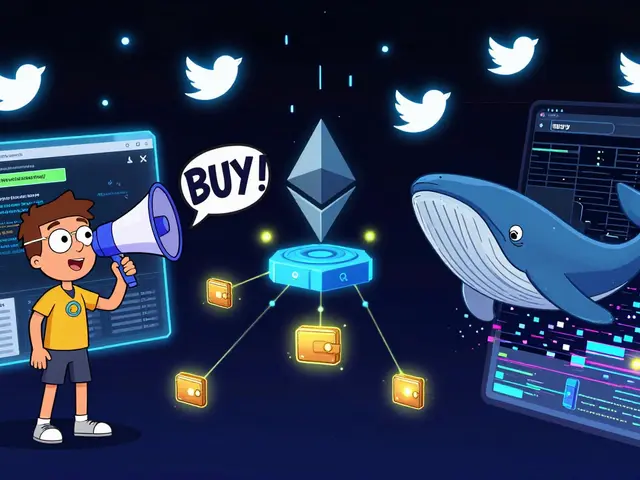
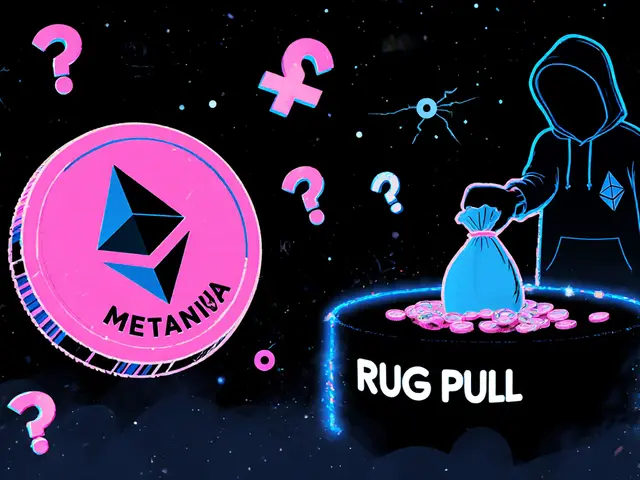

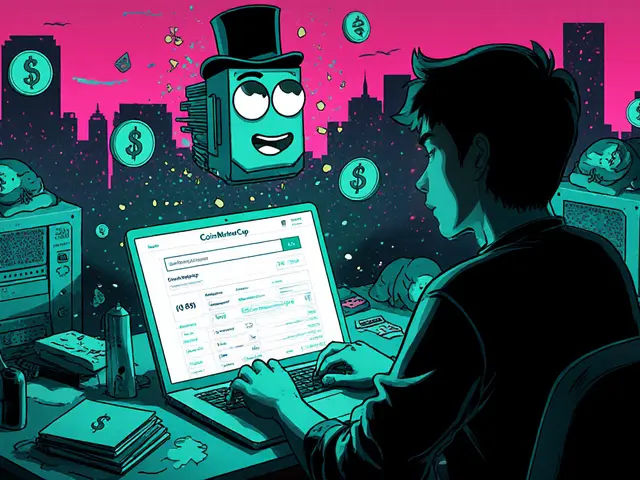
Andy Purvis
Finally some good news out of this mess. I’ve been following this for years and it’s wild to see how a simple policy shift can change lives. No more blanket bans. Just target the bad actors. That’s how it should’ve been all along.
My cousin’s a Syrian-American doctor. She used to send crypto to her family in Aleppo just to help them buy food. Now she can do it without sweating every transaction. That’s real impact.